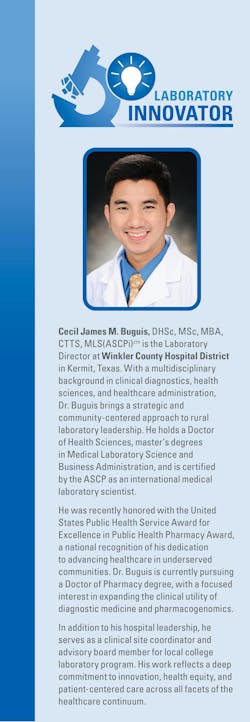As a rural laboratory, what kind of staffing challenges does the Winkler County Hospital District Laboratory have and what ways do you try to overcome them?
As the Laboratory Director of a rural hospital, I’ve seen firsthand how staffing challenges can deeply impact operations. In our region, one of the main issues is a general lack of awareness about the Medical Laboratory Science profession. This often results in fewer students pursuing this path, and subsequently, a limited pipeline of trained personnel entering the workforce. To address this, we participate in local career fairs and set up educational booths during community events like Kermit Week. We also distribute ASCP Lab Drawer Kits, hoping to spark curiosity in young minds about the world of diagnostic science.
Beyond outreach, I serve on the advisory committee for the Medical Laboratory Technology and Phlebotomy programs at Odessa College. Our hospital is also a clinical training site for the college, allowing students to gain hands-on experience in real healthcare settings.
Another hurdle is the scarcity of qualified professionals within our geographic area. Many graduates gravitate toward larger cities, so recruitment is an ongoing challenge. In response, I focus on retention—creating a positive, empowered work culture. I’ve eliminated on-call shifts while maintaining 24/7 operations, send staff to external training opportunities, and encourage continued education. Advocacy for their growth is advocacy for the lab’s success.
What efforts has the hospital and laboratory taken to expand healthcare access for its rural patient population?
To expand healthcare access for our rural population, we’ve strengthened our collaboration with the state public health laboratory, enabling us to send out samples for advanced testing at no cost to our patients. This has opened doors to higher-complexity diagnostics while removing financial barriers. We are also pursuing approval to become a Texas Infertility Prevention Project (TIPP) partner, which will allow us to provide free STI testing, specifically for chlamydia and gonorrhea, to uninsured and underinsured individuals. Education, early detection, and access to treatment are at the heart of that initiative. Beyond the lab, the hospital participates in the Adult Safety Net (ASN) program, offering free immunizations to eligible adults. We also host free smoking cessation classes for those committed to quitting tobacco use.
What improvements or innovations has your lab implemented that you could share with other directors of smaller labs?
When it comes to innovation in smaller laboratories, I believe staying relevant is non-negotiable. Technology is evolving, and regulatory guidelines are continuously updated. It’s not enough to keep up—we must be proactive. I emphasize regular review and revision of lab policies and procedures to ensure compliance with the latest standards. But beyond compliance, I urge fellow directors to listen to their communities. Ask your clinicians and stakeholders directly: “How can the lab help you meet your goals?” Tailoring your services to meet those needs builds trust and improves patient care.
How do you handle equipment maintenance and technological upgrades in a rural hospital setting?
Equipment maintenance and technological upgrades in rural hospitals often require creativity, planning, and strong vendor relationships. We prioritize preventive maintenance contracts and align our upgrades with broader hospital initiatives or grant opportunities. Whenever possible, we choose analyzers that are scalable, easy to train on, and supported by remote service capabilities to minimize downtime. Careful review is essential before committing to any new technology. We always conduct a thorough cost-benefit analysis and focus on what matters. We focus on acquiring equipment that serves its intended purpose reliably without placing unnecessary financial strain on the facility. Building rapport with vendors has also been key; many have provided extended warranties and flexible payment terms in recognition of our rural constraints. Strategic planning and advocacy at the administrative level help ensure that laboratory priorities are considered during budget discussions, allowing us to make smart, sustainable investments in technology.
It is also important to plan for the unexpected, as there will be times that a piece of equipment is down. That is why it is important to ensure to have a backup analyzer, or at the very least, point-of-care-testing (POCT) option to continue performing critically important tests such as cardiac markers and other routine chemistry tests.
What does being a lab director mean to you?
Being a laboratory director in a rural hospital goes beyond overseeing operations. It means being a champion of quality, a bridge between the diagnostic and the clinical team, and an advocate for access and equity in healthcare. It’s about serving not just patients, but the entire community by ensuring the lab remains a reliable piece of the puzzle towards a healthier life. I take great pride in guiding our team to adapt, grow, and innovate despite limited resources. At the end of the day, our work directly influences patient outcomes, and that’s a responsibility I carry with honor.


